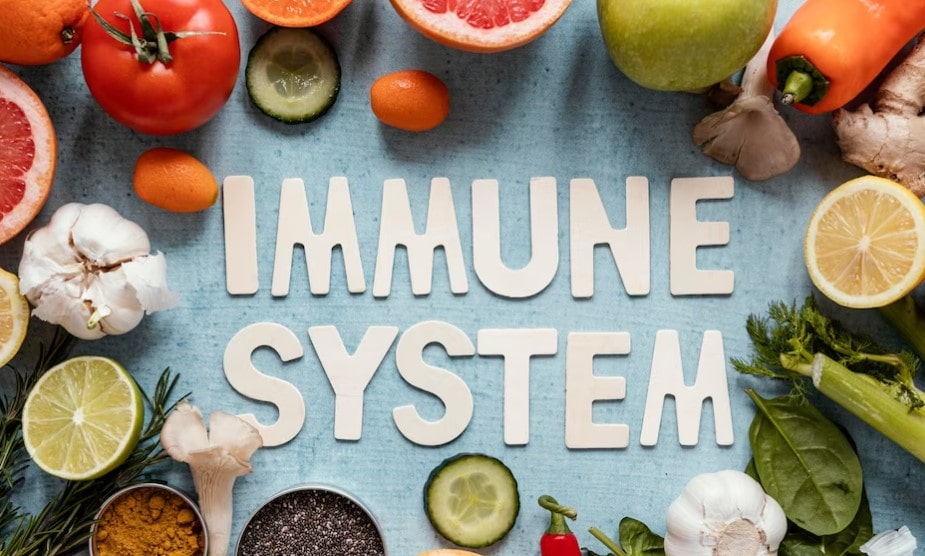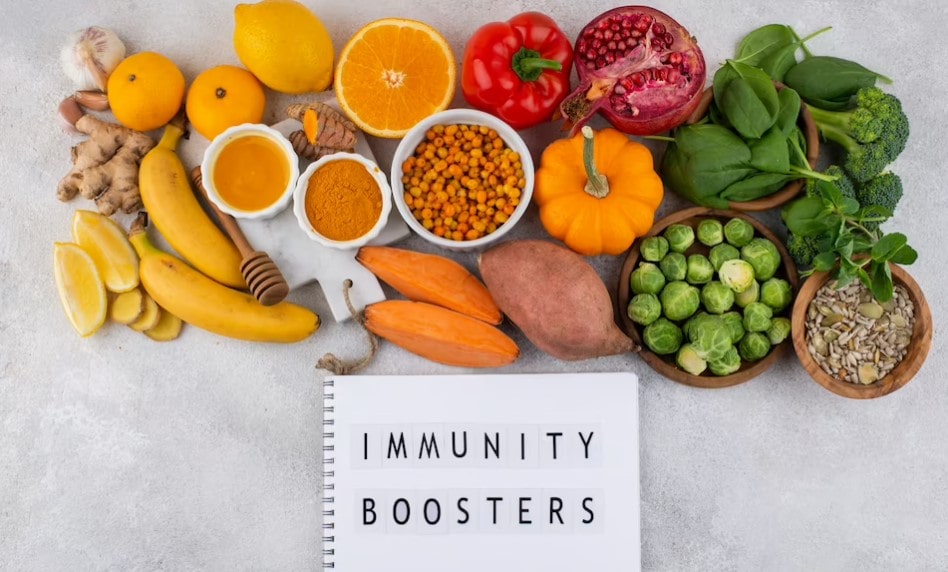As the saying goes, “You are what you eat.” And when it comes to our immune system, this statement couldn’t be more true. Nutrition plays a crucial role in maintaining a strong immune system, which is essential for protecting our bodies from illness and disease.
In this article, we’ll explore the importance of a balanced and varied diet and the key nutrients and foods that can help support immune function, including vitamin C-rich foods, zinc-rich foods, probiotic-rich foods, garlic, ginger, and leafy greens.
Foods high in Vitamin C for the immune system:

Vitamin C is an important antioxidant that plays a critical role in immune function. It helps to stimulate the production of white blood cells, which are essential for fighting off infections. Here are some excellent sources of vitamin C:
- Citrus fruits (oranges, lemons, limes, grapefruits)
- Bell peppers (red, green, yellow)
- Strawberries
- Kiwi
- Papaya
- Pineapple
- Mango
Reference:
- Carr, A. C., & Maggini, S. (2017). Vitamin C and immune function. Nutrients, 9(11), 1211. doi: 10.3390/nu9111211
Foods high in Zinc for the immune system:

Zinc is a mineral that is essential for the proper functioning of the immune system. It helps to support the integrity of the immune system’s barriers (e.g., skin and mucous membranes) and is involved in the production of immune cells. Here are some excellent sources of zinc:
- Oysters
- Beef (lean cuts)
- Chicken (dark meat)
- Beans (chickpeas, kidney beans, lentils)
- Nuts (cashews, almonds, peanuts)
Reference:
- Wessels, I., Maywald, M., & Rink, L. (2017). Zinc as a gatekeeper of immune function. Nutrients, 9(12), 1286. doi: 10.3390/nu9121286
Foods high in Probiotics for the immune system:

Probiotics are live bacteria and yeasts that are beneficial for gut health and overall immunity. They help to maintain a healthy balance of gut bacteria, which is essential for immune function. Here are some excellent sources of probiotics:
- Yogurt (look for varieties that contain live and active cultures)
- Kefir
- Sauerkraut
- Kimchi
- Miso
- Tempeh
Reference:
- Gibson, G. R., Hutkins, R., Sanders, M. E., Prescott, S. L., Reimer, R. A., Salminen, S. J., . . . Reid, G. (2017). Expert consensus document: The International Scientific Association for Probiotics and Prebiotics (ISAPP) consensus statement on the definition and scope of prebiotics. Nature Reviews Gastroenterology & Hepatology, 14(8), 491-502. doi: 10.1038/nrgastro.2017.75
Garlic and Ginger for the immune system:

Garlic and ginger are well-known for their immune-boosting properties. They contain compounds that have antimicrobial, anti-inflammatory, and antioxidant effects. Here are some ways to incorporate garlic and ginger into your diet:
- Add minced garlic and ginger to soups, stews, and stir-fries
- Use garlic and ginger to season your favorite dishes
- Make ginger tea or add sliced ginger to your water bottle
Reference:
- Dugasani, S., Pichika, M. R., Nadarajah, V. D., Balijepalli, M. K., Tandra, S., & Korlakunta, J. N. (2010). Comparative antioxidant and anti-inflammatory effects of [6]-gingerol, [8]-gingerol, [10]-gingerol and [6]-shogaol. Journal of Ethnopharmacology, 127(2), 515-520. doi:
Leafy greens for the immune system:

Leafy greens are packed with nutrients that are essential for immune function and overall health. They are rich in vitamins, minerals, and antioxidants, which help to support the immune system. Here are some excellent options:
- Spinach
- Kale
- Arugula
- Swiss chard
- Collard greens
- Beet greens
- Watercress
Reference:
- Maggini, S., Wintergerst, E. S., Beveridge, S., & Hornig, D. H. (2007). Selected vitamins and trace elements support immune function by strengthening epithelial barriers and cellular and humoral immune responses. British Journal of Nutrition, 98(S1), S29-S35. doi: 10.1017/S0007114507832971
healthy and delicious meals that support immune system health
Focus on whole foods: Try to eat a variety of whole foods, including fruits, vegetables, whole grains, lean proteins, and healthy fats.
Use herbs and spices: Many herbs and spices have immune-boosting properties. Add them to your meals to add flavor and nutrition.
Plan ahead: Plan your meals and snacks in advance to ensure that you have healthy options on hand.
Cook at home: Cooking at home allows you to control the ingredients and ensure that your meals are healthy and nutritious.
Stay hydrated: Drinking plenty of water and other fluids is important for immune function and overall health.
Tips for incorporating immune-boosting foods into your diet
Add fruits and vegetables to every meal: Try to include at least one serving of fruits or vegetables with every meal to ensure that you’re getting a variety of vitamins and minerals.
Choose lean proteins: Lean proteins like chicken, fish, and beans are important for immune function and overall health. Try to include these foods in your meals as often as possible.
Snack smart: Choose healthy snacks that are high in nutrients and low in sugar and processed ingredients. Some good options include nuts, seeds, fruits, and vegetables.
Experiment with new recipes: Trying new recipes can help you stay motivated and interested in healthy eating. Look for recipes that incorporate immune-boosting foods like garlic, ginger, and leafy greens.
Take supplements if necessary: While it’s always best to get your nutrients from whole foods, supplements can be helpful if you’re not able to get enough from your diet. Talk to your healthcare provider about whether supplements are right for you.
Conclusion
Incorporating immune-boosting foods into your diet is a simple and effective way to support your immune system and overall health. By including a variety of nutrient-dense foods in your meals, you can ensure that your body is getting the vitamins, minerals, and other nutrients it needs to function at its best.
Whether you’re looking to prevent illness, recover from an illness, or simply maintain optimal health, a balanced and varied diet that includes immune-boosting foods like vitamin C-rich foods, zinc-rich foods, probiotic-rich foods, garlic, ginger, and leafy greens can make all the difference. So start experimenting with new recipes, snacking smart, and incorporating these foods into your diet today!









